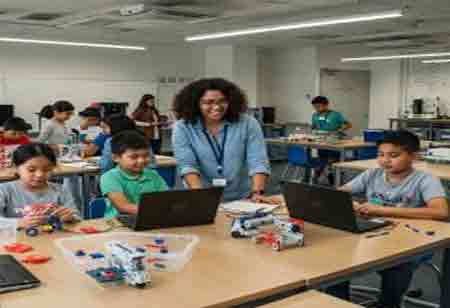THANK YOU FOR SUBSCRIBING
Be first to read the latest tech news, Industry Leader's Insights, and CIO interviews of medium and large enterprises exclusively from Education Technology Insights
Transformative Strategies for Student Engagement
Student engagement is pivotal for effective learning, influencing academic success, motivation, and well-being.

By
Education Technology Insights | Thursday, July 18, 2024
Stay ahead of the industry with exclusive feature stories on the top companies, expert insights and the latest news delivered straight to your inbox. Subscribe today.
Engagement strategies approach inclusivity, critical thinking, collaboration, and motivation, enhancing students' academic success and personal growth in today's interconnected world.
FREMONT, CA: Student engagement is pivotal for effective learning, influencing academic success, motivation, and well-being. It enables a conducive learning environment and deepens students' connection with the material, promoting inclusivity and accommodating diverse needs. This fosters inclusivity and accommodates varying student needs and abilities, enhancing the learning journey and ensuring a rewarding educational experience.
Here are a few engagement strategies that involve active participation:
Digital Engagement: This involves using technology to engage students through interactive and multimedia content, online discussions, virtual simulations, and educational games. It leverages digital tools and platforms to enhance learning experiences, promote active participation, and provide personalised learning opportunities that cater to diverse student needs and preferences. Digital engagement fosters collaboration, critical thinking, and digital literacy skills essential for navigating today's interconnected world.
Cognitive Engagement: Focuses on stimulating students' thinking processes, encouraging active participation in learning activities, and promoting more profound understanding and application of knowledge. This, in turn, enhances critical thinking, problem-solving, and analytical skills development through interactive discussions, hands-on activities, and reflective tasks by challenging students to explore concepts from multiple perspectives and apply their learning contexts.
Social Engagement: Encourages student interaction and collaboration in learning, teamwork, and social skills development. This promotes a supportive classroom environment where students learn from each other through group discussions, collaborative projects, and joint problem-solving activities. By cultivating interpersonal skills, communication abilities, and empathy, they enhance their overall learning experience and personal growth.
Motivational Engagement: This mode of engagement involves strategies to enhance students' motivation, interest, and perseverance in learning tasks by aligning learning objectives with their personal goals and interests. It focuses on creating a supportive and inspiring learning environment that encourages students to set and achieve challenging goals and take ownership of their learning journey. By connecting learning activities to meaningful outcomes and recognising students' achievements and passion for learning, students are encouraged to persist through difficulties.
Behavioural Engagement: This includes classroom tasks, attendance, punctuality, and adherence to academic and behavioural expectations. It focuses on observable actions and behaviours that indicate students' active participation and commitment to learning. It encompasses following instructions, completing assignments on time, participating in discussions, demonstrating respect for teachers and contributing positively to the classroom community.
Experiential Engagement: Hands-on learning experiences that actively involve students' applications of knowledge. It emphasises learning by doing, where students engage in experiments, field trips, and simulations. Project-based learning promotes critical thinking, problem-solving, and creativity by providing opportunities to explore, discover, and apply theoretical concepts in practical contexts. It enhances students' understanding and retention of information while developing skills necessary for future academic and professional success.
Emotional Engagement: Focuses on creating a positive and supportive emotional connection to learning. It involves strategies to sense belonging, intrinsic motivation, and emotional well-being among students to develop a passion for learning by connecting academic content to their interests and values. It emphasises empathy and self-awareness, helping students manage challenges and maintain enthusiasm for learning.
The approaches create a unique learning environment that nurtures essential skills for success in an interconnected world. They foster academic achievement and personal growth while equipping students with the demands of the modern era. By emphasising active participation, collaboration, and learning experiences, educators cultivate an active classroom environment that empowers students to succeed in today's developing educational landscape.







